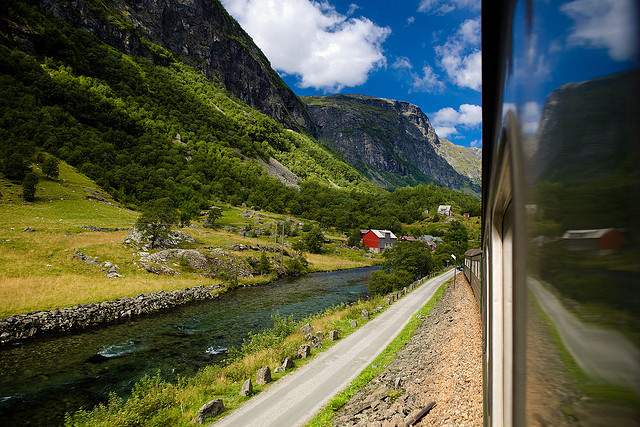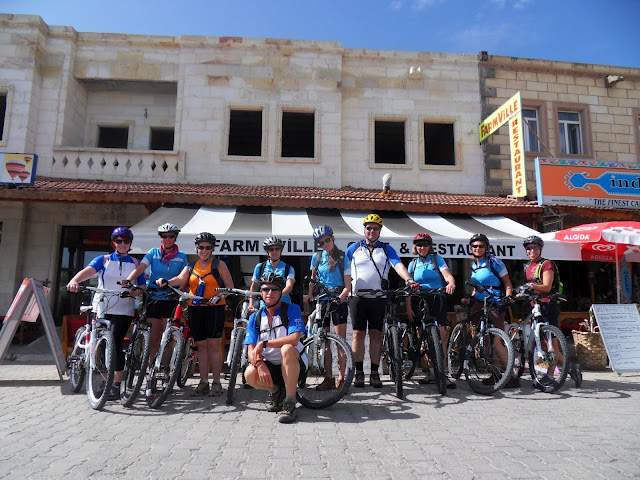Our “Sustainable Travel“ series is sponsored by Global Basecamps. Global Basecamps is specialty travel company that helps independent travelers research and book locally owned boutique hotels, off-the-beaten path lodges and multi-day excursions all over the world. Whether hiking the Inca Trail, experiencing a traditional Japanese Ryokan, or relaxing on the beaches of Thailand, Global Basecamps specializes in designing completely customized itineraries to meet each travelers specific priorities and match their travel style.
Few people would argue against sustainable and environmentally friendly travel, but even with the best intentions, the reality is not always so simple. Here are 6 of the mostly commonly used excuses for an escalating carbon footprint, and some hassle free ways to stop feeling guilty and make eco-friendly travel easy.
1. The excuse: Eco lodges are so expensive
Solution: Live like a local

Travel brochures are full of luxury eco lodges and plush hotels with impressive sounding green credentials, all of which are great if you can afford them, but being eco-friendly lends itself to being on a budget. Look for small, locally run establishments where the outgoings are less and the impact on the local community much greater. There are plenty of homestay options available too – from sharing resources with like-minded travelers through online networks like couchsurfing or working for your keep through voluntary organizations like WWOOF or Help Xchange.
You can make a difference by choosing to adapt to the local lifestyle too, especially in the developing world – only use electricity when necessary, skip the hot showers on a hot day and brave the composting squat toilets. If you do find yourself in a more upmarket hotel, at least go without the toiletries and daily linen change, and keep the air con to a minimum.
2. The excuse: It’s too difficult to find ‘eco-friendly’ alternatives
Solution: Plan ahead
Searching for a place to recycle goods on the road. Quizzing your tour providers on their environmental policies. Totaling your carbon footprint. Weighing up the benefits of carbon offset schemes. Being eco-friendly on the road can easily become a lot of work. Instead of worrying over the big issues, take some of the hassle out of it by thinking ahead and packing solutions to smaller daily problems – your efforts will soon add up. Invest in a wind-up torch, a portable solar charger for your gadgets, and a reusable water bottle to cut down on wastage. For laundry, take along some eco-friendly detergent so you can hand-wash your own laundry, bring a washing line to hang your wet clothes, and pack items that are easy to wash and dry. Make sure you pack light, too – the less weight you lug around with you, the better.
3. The excuse: I don’t want to miss out
Solution: Try an eco-friendly activity

Think being eco-friendly is about walking everywhere and avoiding adventure activities to keep your carbon footprint down? Well, you might want to opt out of that helicopter ride and swap quad biking for mountain biking, but there are loads of activities that will get your adrenaline racing without harming the environment. Hiking, horseback riding, and kayaking are all popular activities, or try something more exciting like paragliding, tubing, or learning to surf. Get creative – as long as your fun isn’t damaging the natural environment or using excess fuel, it’s unlikely to do much harm!
4. The excuse: Flying to the other side of the world is hardly eco-friendly.
Solution: Take the long route.

Regardless of how well you offset your carbons, it’s hard to get around the fact that flying is most definitely not eco-friendly. One option, of course, is to follow the recent trend for “staycations” and opt to explore your own country, but if you’re set on somewhere more exotic, select transport options that will minimize your carbon footprint. First, book the most direct flight path and ditch the stopover – a good portion of fuel is used up during take-off and landing, so while you might not be able to eliminate flying altogether, you can at least cut down on emissions by reducing the number of flights you take. Second, opt to travel slower and use local transport – cut out the domestic flights and take the train or bus instead, not only will you save on fuel but you’ll get to admire the views along the way. Think about the transport you use to get around town, too – walk short distances or hire a bike to get you around the sights.
[social]
5. The excuse: I don’t want to have to cut down while I’m on holiday.
Solution: Buy local.

Whether you’re spending your life-savings on a RTW trip or using your minimal holiday time to escape overseas, the likelihood is that you don’t want to miss out on anything during your trip. The good news is that you can spend your money guilt-free as long you follow one simple directive – buy local. Forgo the souvenir stores and hit the markets for unique, locally-produced souvenirs; skip the swish restaurants with their western menus and sample some local grub at the street stalls. Ask a local for the best place to get a massage instead of booking into the hotel spa. Not only will you be supporting the local economy (a key component of sustainable tourism) and probably saving a few dollars, too, but you’ll open yourself up to a host of new experiences – haggling for goods at the local market or complementing food vendors on their concoctions are great ways to break the ice and secure yourself some local friends.
6. The excuse: It still sounds like a lot of hassle.
Solution: Let someone else plan it for you.

If you’re really concerned about planning an eco-friendly trip but don’t have the time or motivation to do it without some help, rest assured that there are now a host of tour companies that practice responsible tourism. Booking a tour or letting someone else make the bookings can take a lot of the hassle out of traveling, especially if you’re short on time and want to cram in multiple locations. Don’t just take their word for it though, make sure you question their ethical and environmental policies before you sign on – how much of your money will go to people or companies within the country you are visiting; do they use local guides; what kind of transport is used throughout the trip; where does the food and drink on the trip come from; which hotels/guesthouses will you stay in, and what are their eco credentials? A reputable tour company will be happy to answer any questions and will probably relish the opportunity to share their efforts with you.
Read more about ecotourism around the world:
- 8 of the Best “Live Like a Local” Experiences
- 10 Festivals that Celebrate Local Produce
- Paradise on a Budget: Eco Retreats that Won’t Break the Bank
- 10 Tips for More Eco-Friendly Travel
- How to Plan an Eco-Friendly RTW Trip: 9 Destinations to Go Green
- 6 Things You Didn’t Know About Ecotourism
- 8 Green Ways to Experience Belize
- 10 of Europe’s Most Eco-Friendly Cities
Global Basecamps is a sustainable travel company specializing in making eco tourism as user-friendly as possible. We have already done all the research for you, and found the best off the beaten path eco lodges, local guides, and exclusive tours to match your budget and travel goals! Whether you want a cultural Japanese tour, a Tanzania eco safari, or a sustainable Galapagos Island cruise, Global Basecamps is ready to create the custom trip of your dreams.
Photo credits: 1 – Accommodation – oregon_coast; 2- Plan ahead – iHyd; 3- Eco Activities – Razvan Marescu; 4 – Transport – kennymatic; 5- Buy local – Globalcitizen01; 6 – Tours – author


